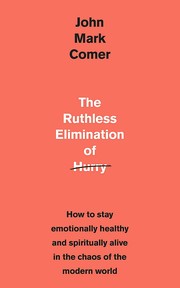A very good book. The book first lays out the dire situation we are in- if I had to pick a thesis statement for this book, it would be:
We are… distracting ourselves into spiritual oblivion.
— Ronald Rolheiser. We, as Americans, are way too busy cramming our lives full of stuff and activities we think will make us happy, but if to follow Jesus’s example, we need to slow down.
Reading this book confirmed a lot of the things I was already considering or doing— dropping social media, losing focus on worldly success, focusing on friendships and life-giving activities. I strongly recommend reading this book. Beware: it’s easy to forget a lot of these things, and go back to normal life. Try to make changes in your life. Otherwise, what was the point of reading it?
One immediate change I noticed after reading this book is that I pray more. Because I choose to “be bored,” I find that I have plenty of opportunities to pray.
Notes
- Consider creating no-phone days or long stretches of time when I’m not allowed to use my phone.
- Wisdom is born in the quiet, the slow.
- Your life is no more than the sum of the things you give your attention to.
- What good is it to gain the whole world, and lose your soul?
- We live in a culture that wants to cheat time and space to achieve everything, instead of accepting them. Accept that you can’t do it all!
- We find God’s will for our lives in our limitations.
- I doubt Jesus’s agenda is to make poor people middle class or middle class people wealthy. Jesus blessed the “poor in spirit” by the thousands.
- Each activity we say yes to, is a thousand activities we say no to. Every yes is a thousand nos.
- Paul: “look carefully then how you walk, not as unwise but as wise, making the best use of time, because the days are evil.”
- Churches in the US completely drop the idea of “Jesus as a lifestyle” and instead focus on “Jesus as truth.” They are both important.
- We should emulate the habits of Jesus (AKA spiritual discipline).
- Reclaim boredom, because boredom leads to prayer.
- Each moment is full of goodness; inhibit the moment! Don’t miss the goodness of each moment.
4 steps of discipline:
- Silence and Solitude.
- Jesus, in the Gospels, chose multiple times to seek silence/solitude/prayer.
- When we avoid this, we:
- End up feeling distant from God (I can relate)
- Feel distant from ourselves
- Feel exhausted
- Turn to our escapes
- When we embrace this, we:
- Start to feel more.
- Start to know who we are.
- Sabbath
- Human desire is infinite; only God satisfies this. We are not meant to detach from all desire (e.g. Buddhism), but point it towards God; to reach a place where we no longer need anything to live a happy, restful life.
- Sabbath comes from Shabbat, which means “to stop” or “to enjoy”.
-
The Sabbath was made for man, not man for the Sabbath.
—Jesus - Make Sabbath a day you enjoy and look forward to! It’s for rest and worship. When practicing Sabbath, ask yourself “is this rest or worship?”
- Simplicity
- Gospel of America: the more you have, the happier you’ll be.
- Why don’t we work 3 hours a day and have robots do all our work? Because we, as a nation, have chosen money and stuff over time.
- Choose time over money and stuff.
- “You cannot serve both God and money.” It says cannot, not should not!
- Slowness
Changes
- Create no-phone times.
- Create a Sabbath time for rest and worship only.
- Choose to be bored sometimes instead of reaching for my phone.
Reminders
- Inhibit the moment. Don’t miss the goodness of each moment.
- Reclaim boredom, because boredom leads to prayer.
- I doubt Jesus’s agenda is to make poor people middle class or middle class people wealthy. Jesus blessed the “poor in spirit” by the thousands.
